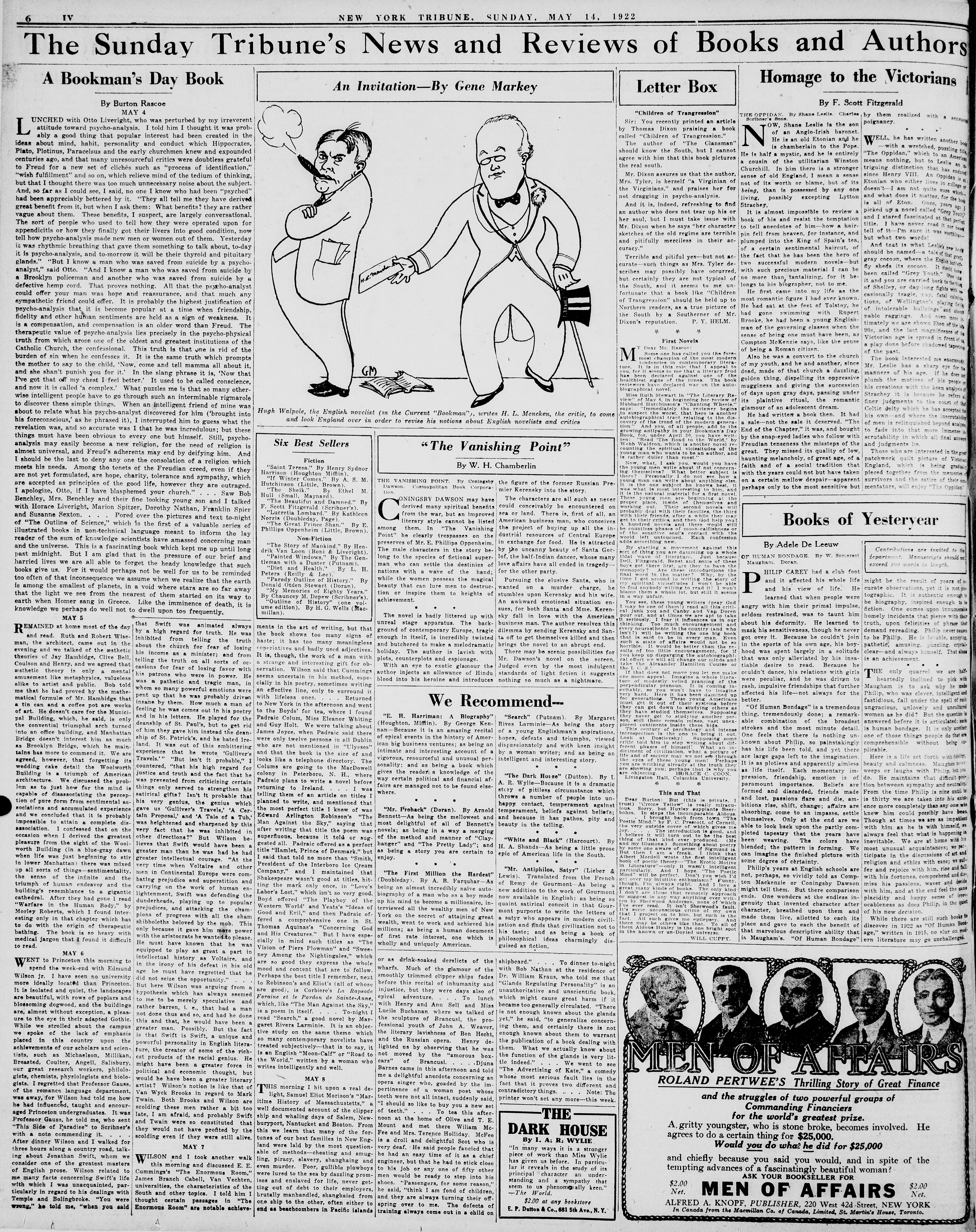
Homage to the Victorians
by F. Scott Fitzgerald
The Oppidan. By Shane Leslie. Charles Scribner’s Sons.
Now, Shane Leslie is the son of an Anglo-Irish baronet. He is an old Etonian1 and he is chamberlain to the Pope. He is half a mystic, and he is entirely a cousin of the utilitarian Winston Churchill.2 In him there is a stronger sense of old England, I mean a sense not of its worth or blame, but of its being, than is possessed by any one living, possibly excepting Lytton Strachey.3
It is almost impossible to review a book of his and resist the temptation to tell anecdotes of him—how a hair-pin fell from heaven, for instance, and plumped into the King of Spain’s tea, of a certain sentimental haircut, of the fact that he has been the hero of two successful modern novels—but with such precious material I can be no more than tantalizing, for it belongs to his biographer, not to me.
He first came into my life as the most romantic figure I had ever known. He had sat at the feet of Tolstoy, he had gone swimming with Rupert Brooke, he had been a young Englishman of the governing classes when the sense of being one must have been, as Compton Mackenzie says, like the sense of being a Roman citizen.
Also, he was a convert to the church of my youth, and he and another,4 since dead, made of that church a dazzling, golden thing, dispelling its oppressive mugginess and giving the succession of days upon gray days, passing under its plaintive ritual, the romantic glamour of an adolescent dream.
He had written a book then. It had a sale—not the sale it deserved. The End of the Chapter, it was; and bought by the snap- eyed ladies who follow with Freudian tenseness the missteps of the great. They missed its quality of low, haunting melancholy, of great age, of a faith and of a social tradition that with the years could not but have taken on a certain mellow despair—apparent perhaps only to the most sensitive but by them realized with a sensuous poignancy.
Well, he has written another book—with a wretched, puzzling title, The Oppidan, which to an American means nothing, but to Leslie an intriguing distinction, that has endured since Henry VIII. An Oppidan is an Etonian who either lives in college or doesn’t—I am not quite sure which—and what does it matter, for the book is all of Eton. Once, years ago I picked up a novel called Gray Youth,5 and I stared fascinated at that perfect title. I have never read it nor heard tell of it—I’m sure it was worthless—but what two words!
And that is what Leslie’s new book should be named—a tale of that gray, gray cocoon, where the English-butterfly sheds its cocoon. It should have been called Gray Youth. Once in it and you are carried back to the time of Shelley, or day-long fights with occasionally tragic, nay, fatal culminations, of Wellington’s playing fields,6 of intolerable bullyings and abominable raggings. And even more intimately we are shown Eton of the late 90s, and the last magnificence of the Victorian age is spread in front of us, a play done before shadowed tapestries of the past.
The book interested me enormously. Mr. Leslie has a sharp eye for the manners of his age. If he does not plumb the motives of his people or his creations with the keen analysis of Strachey, it is because he refers finer judgments to the court of the Celtic deity which he has accepted for his own—and where the inscrutability of men is relinquished beyond analysis, to fade into that more immense inscrutability in which all final answers and judgments lie.
Those who are interested in the great patchwork quilt picture of Victorian England, which is being gradually pieced together from the memories of survivors and the satire of their commentators, will enjoy The Oppidan.
Notes
1. A graduate of Eton, one of England’s most prestigious public (i.e., private) schools.
2. By 1922 British statesman Winston Churchill (1874-1965) had already earned a formidable reputation as a political leader and historian.
3. English biographer (1880-1932), author of Eminent Victorians (1918).
4. Monsignor Cyril Sigourney Webster Fay, who had befriended Fitzgerald during his prep-school and college years.
5. 1914 novel by Oliver Onions (1873-1961).
6. The Duke of Wellington (1769-1852) remarked that the Battle of Waterloo was won on the playing fields of Eton.
Published in New York Tribune newspaper (14 May 1922, Sect. IV).
Not illustrated.
